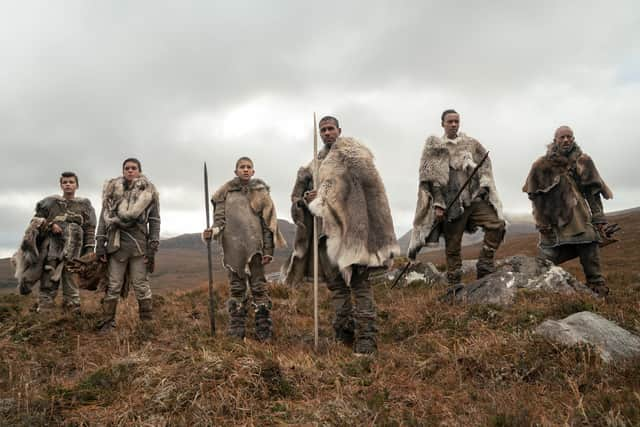Andrew Cumming on his Highlands-set horror film The Origin: 'You get one chance to have a big swing'
A palaeolithic horror film, shot in the Highlands, featuring a largely unknown cast, all talking in an authentic-sounding, yet made-up, stone-age language called Tola… As feature pitches go, Scottish director Andrew Cumming’s debut film, The Origin, is the sort of bold swing for the fences that’s all too rare in this country. Receiving its Scottish premiere at this year’s Glasgow Film Festival, it revolves around a tribe of early humans arriving in a desolate new land where a scarcity of food and a mysterious nocturnal threat start decimating their numbers and fuelling paranoia, distrust and hatred among those left alive. Like other wilderness survival thrillers, it’s the sort of meaty genre effort that riffs on its premise in interesting ways, using it to tap into big themes about the cyclical nature of violence and fear of others, but within its own unique setting – something inspired not so much by previous prehistoric B-movies (10,000 BC, Quest for Fire), but Andrew Marr’s History of the World TV series from 2012.
“I was just sort of taken by this little reenactment of early modern humans,” says Cumming over a Zoom call from his home in Fife. “I thought: ‘Oh, there's a sandbox that hasn't been played in for a while.’” This was back in 2015, when Cumming was a still a recent graduate of the National Film and Television School and taking meetings with potential collaborators, among them future Saint Maud producer Oliver Kassman. Kassman also wanted to do something unconventional and sat down to write an outline, one that would allow them and the film’s eventual screenwriter, Ruth Greenberg, to explore all their own anxieties about the imminence of Brexit, Trump’s political rise and the increasing willingness to blame others for society’s ills. “It felt like it was really sort of febrile territory to discuss those themes, but through the vehicle of a genre movie that will hopefully get eyeballs on it.”
Advertisement
Hide AdHe was also pretty insistent on doing it in Scotland, in part because of the opportunity it afforded him to tell a timeless story. Remove the epigraph setting it 45,000 years ago and it could be a prehistoric film, it could be a sci-fi film, so alien is the surrounding landscape – something Stanley Kubrick (who use parts of the Hebrides for the trippy Stargate sequence in 2001), Nicholas Winding Refn (who shot his apocalyptic Viking movie Valhalla Rising around Glen Kinglass and Glen Affric) and Ridley Scott (who shot the stunning opening to Prometheus on Skye) have all understood. “Exactly,” says Cumming. “And I’m like: ‘Where are the Scots using Scotland in that way?’ So it was nice to follow in their footsteps a little bit and, you know, stay away from council estates.”


Shot during the height of the pandemic in November 2020, within an hour’s radius of the Gairloch Hotel (which the production hired out, creating a bubble for the duration of the six week shoot), the location posed its own challenges. But the isolation and the meteorological uncertainty (the weather “changed between shit and not as shit” quips Cumming) was actually positive. “There’s that selfish part of you that goes, ‘Yes, this has cropped up, but it looks amazing. There’s no way to fake a torrential downpour.’”
The six-strong international cast, led by British actors Chuku Modu and newcomer Safia Oakley-Green, also benefitted from the laser-focus that came from being cut off, not least when it came to learning the aforementioned pre-historic language, which was constructed from Basque, Arabic and Sanskrit and which the cast had to make sound naturalistic. “They got it straight away,” says Cumming, though he admits to having his own doubts though about doing it in English. "Then the more I thought about it, the more I thought, ‘You get one chance to have a big swing. Don’t be lazy.’”
It makes sense Cumming would think this way. He’s spent a lot of years getting to this point. After doing an animation degree in Dundee, he set his sights on going to the National Film and Television School and got early encouragement from Lynne Ramsay, who was on the interview panel and liked the scrappy, shot-for-£50 digital short he’d submitted. He didn’t get in, but undeterred, he spent several more years honing his craft, making more shorts and shooting corporate videos for charities, applying again and again until he eventually he won a place. He screened his graduation film at London’s National Film Theatre in 2013 and returned there last October to show The Origin at the London Film Festival. It was, he says, “a nice closing of the circuit.”
Next up is Line of Duty creator Jed Mercurio’s new Edinburgh-set crime drama Payback, which he’s currently editing having directed three episodes. Beyond that, he’s got a couple of “non-horror” films in development and has just signed with a Hollywood agency so is looking forward to meeting production companies in the US and hopefully getting some good scripts through. Up first, though, is that GFF homecoming, which will give Scottish-based audiences a chance to see The Origin the way it’s meant to be seen. “The big-screen experience is so under threat,” he sighs, bemoaning the move to streaming. He’d much rather audiences submitted to the experience in a cinema. “You want to pin them down in their seat for 90 minutes,” he laughs. “You know, like Malcolm McDowell in A Clockwork Orange.”
The Origin screens at Glasgow Film Festival on 5 and 7 March, https://glasgowfilm.org/glasgow-film-festival